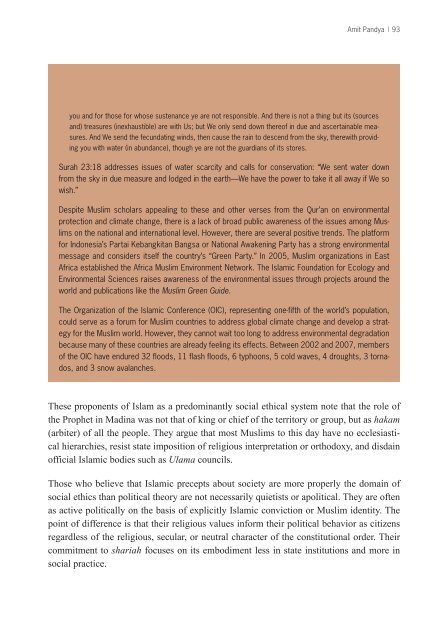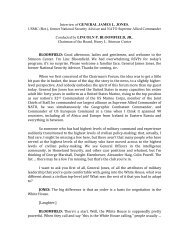Islam and Politics - The Stimson Center
Islam and Politics - The Stimson Center
Islam and Politics - The Stimson Center
You also want an ePaper? Increase the reach of your titles
YUMPU automatically turns print PDFs into web optimized ePapers that Google loves.
Amit P<strong>and</strong>ya | 93<br />
you <strong>and</strong> for those for whose sustenance ye are not responsible. And there is not a thing but its (sources<br />
<strong>and</strong>) treasures (inexhaustible) are with Us; but We only send down thereof in due <strong>and</strong> ascertainable measures.<br />
And We send the fecundating winds, then cause the rain to descend from the sky, therewith providing<br />
you with water (in abundance), though ye are not the guardians of its stores.<br />
Surah 23:18 addresses issues of water scarcity <strong>and</strong> calls for conservation: “We sent water down<br />
from the sky in due measure <strong>and</strong> lodged in the earth—We have the power to take it all away if We so<br />
wish.”<br />
Despite Muslim scholars appealing to these <strong>and</strong> other verses from the Qur’an on environmental<br />
protection <strong>and</strong> climate change, there is a lack of broad public awareness of the issues among Muslims<br />
on the national <strong>and</strong> international level. However, there are several positive trends. <strong>The</strong> platform<br />
for Indonesia’s Partai Kebangkitan Bangsa or National Awakening Party has a strong environmental<br />
message <strong>and</strong> considers itself the country’s “Green Party.” In 2005, Muslim organizations in East<br />
Africa established the Africa Muslim Environment Network. <strong>The</strong> <strong>Islam</strong>ic Foundation for Ecology <strong>and</strong><br />
Environmental Sciences raises awareness of the environmental issues through projects around the<br />
world <strong>and</strong> publications like the Muslim Green Guide.<br />
<strong>The</strong> Organization of the <strong>Islam</strong>ic Conference (OIC), representing one-fifth of the world’s population,<br />
could serve as a forum for Muslim countries to address global climate change <strong>and</strong> develop a strategy<br />
for the Muslim world. However, they cannot wait too long to address environmental degradation<br />
because many of these countries are already feeling its effects. Between 2002 <strong>and</strong> 2007, members<br />
of the OIC have endured 32 floods, 11 flash floods, 6 typhoons, 5 cold waves, 4 droughts, 3 tornados,<br />
<strong>and</strong> 3 snow avalanches.<br />
<strong>The</strong>se proponents of <strong>Islam</strong> as a predominantly social ethical system note that the role of<br />
the Prophet in Madina was not that of king or chief of the territory or group, but as hakam<br />
(arbiter) of all the people. <strong>The</strong>y argue that most Muslims to this day have no ecclesiastical<br />
hierarchies, resist state imposition of religious interpretation or orthodoxy, <strong>and</strong> disdain<br />
official <strong>Islam</strong>ic bodies such as Ulama councils.<br />
Those who believe that <strong>Islam</strong>ic precepts about society are more properly the domain of<br />
social ethics than political theory are not necessarily quietists or apolitical. <strong>The</strong>y are often<br />
as active politically on the basis of explicitly <strong>Islam</strong>ic conviction or Muslim identity. <strong>The</strong><br />
point of difference is that their religious values inform their political behavior as citizens<br />
regardless of the religious, secular, or neutral character of the constitutional order. <strong>The</strong>ir<br />
commitment to shariah focuses on its embodiment less in state institutions <strong>and</strong> more in<br />
social practice.

















